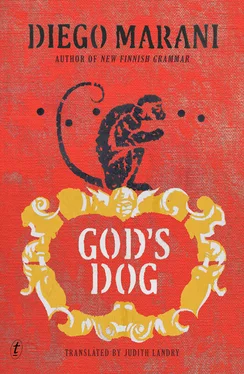She remembered a distant September afternoon they’d spent together by the sea; the sand had looked positively black in the setting sun, the bathing attendants were folding up the deckchairs and the hawkers were wheeling carts piled high with unsold clothes up the concrete walkways all along the beach, their long shadows weaving over the white walls of the bathing-huts. An old fisherman up to his waist in water was scrabbling doggedly about in the sand in search of clams; he had the hard, rough skin of a man who has spent the whole summer in the sun. She and Ivan had sat down at the water’s edge.
‘Look! If you go far enough out, you’ll come to America…’ Ivan had said meaningfully, looking towards the setting sun.
‘Rubbish: if you go far enough out, you’ll come to Sardinia,’ she had replied, taking the wind out of his sails. They’d both burst out laughing, hugging one another and rolling round in the sand, two bodies forming one joyful whole. Those were the days when anything could make them laugh until they cried. Everything was still in place, everything was possible.
The sound of a bus driving off from the traffic-lights interrupted Marta’s train of thought. Outside, it was getting light; the room was slowly emerging from the darkness. Marta picked her clothes up from the chair and dressed herself; she was in no hurry. She put on her make-up carefully while the coffee gurgled on the stove. When she went out into the street, the first rays of sun were coming in through the blinds and falling on to the suitcase she had left in the room.
After a supper of lentil soup at a table with a group of beggars, he had slept in a refuge run by Caritas. At first light he had got up from the camp-bed and gone out. Empty buses were arriving in the station forecourt. The bells of the first Easter Day mass could just be heard above the clanging of the overhead railway. On the wall of the ticket-office in the bus station Salazar found a map of the bus routes between there and the sea. He studied the coastline, trying to work out where he might have been held captive. A thick pinewood, low-rise holiday homes, abut half an hour out of town. He located two possibilities: the stretch of coast between Fregene and Focene, or the coast around Castel Fusano. Going towards Ostia it was all too built up. The sudden sharp curves ruled out Castel Fusano; to get to Rome from there it would make more sense to take Via Cristoforo Colombo, which was completely straight. The planes that he had heard suggested Fregene or Focene, which were not far from Fiumicino Airport. Salazar rested his finger on the map and began working out how to board the next bus to Fregene. He had to act fast. He could try begging, but there was hardly anyone around, and it would be slow work. Robbing someone outright would be dangerous. So he went into a self-service restaurant in the station and grabbed a fork from the cutlery section, then continued on to the Chapel of Saint Christopher, to the left of the station. Here his goal was the alms-box beneath the row of candles, one of which he lit, pretending to pray while rummaging around in the lock with his fork; at last it broke, yielding up a pile of coins he slipped quickly into his track-suit pocket. He acknowledged the patron saint of travellers with a sign of the cross and left the chapel almost at a run.
He got out at the first stop in Fregene, in front of the police barracks, and went into a bar on the other side of the road. Now he had to find the baker’s shop. He ordered a coffee and drank it at the counter, taking his time. Choosing his moment, when the place was empty, he went up to the barman and asked:
‘Excuse me, can you tell me where the bakeries are here in Fregene? I’m a baker and I’m looking for temporary work.’
The barman was drying the glasses.
‘A bakery?’ he said, turning towards the cashier for further details. It was she who answered for him:
‘There’s Albanesi’s here on the square, or else De Piscopo, near the church. Otherwise you’ll have to go to Fiumicino.’
‘Which way is the church?’
‘Here in the pinewood. What’s the name of the street?’ she asked, turning to her colleague for assistance. But Salazar had already left the bar.
Some trails of mist still lingered in the pinewood. He found the church by following the people who were going to mass, then wandered the nearby streets until he caught the smell of freshly-baked bread. De Piscopo’s bakery was a low building with metal door and window frames and an ugly garish green shop sign. Salazar walked past it and took a road between the trees which gradually narrowed; parts of the asphalt were covered in sand. The villas were thinning out, their entrance gates becoming higher. It was not long before he recognised the view he had seen from the window of the basement; the house in which he had been held stood in a curve of the road. Although the surrounding villas were luxurious in the extreme, this one had no garden and the area around it was choked with weeds; the blinds were down, the windowsills were covered with moss and the eaves had tufts of grass growing in them. A rusty flagpole hung above the peeling door. Perhaps it had once been a Forestry Commission Station, which had been turned into a holiday home and then abandoned. Salazar walked round the building and found a back window he thought he could force open. He found a piece of wood in the undergrowth and managed to raise the blind, then broke the window, turned the handle and climbed in. Everything inside seemed to be in order: a house shut up for the holidays, with mattresses rolled up on their springs and wardrobes open to let in the air. He found the living room with the long table and the dusty pottery; he also found the basement where he had been held. He inspected each room carefully, but the members of the Free Death Brigade had left no sign of their earlier presence. He paid a cursory visit to the kitchen, and was about to leave when he noticed a lump of something white stuck to the stove; at first he thought it was mould, but when he touched it it felt like plastic, or hardened glue. As he walked around, he noticed that the floor was sticky, and the sink was encrusted with that same resin-like material. He opened the cupboards, inspected plates and glasses, pulled out all the saucepans; the larger ones were still damp, their interiors coated with something white. He looked in the dustbin and found a piece of candle. So, someone had been melting wax. He searched the place for other clues. Bathroom, bedrooms and living room revealed nothing. He went out to the back of the house and poked around in the undergrowth, where he found a series of large white plastic tubes which had been cut lengthways; they were three inches wide and about a metre and a half in length. Inside, his fingers came upon lumps of wax similar to those he had found in the kitchen. Now he was beginning to see the light and, as he did so, he felt a sudden shudder of horror creep down his spine. Clearly, the members of the Free Death Brigade had been making candles, and big ones at that. Not to light in front of altars, but more probably to serve as explosive devices. They were to replace the ones on the papal podium in Saint Peter’s Square and send everything sky-high! Now Salazar saw why the man who had questioned him had been so interested in the police patrols on the podium! He clenched his fists and cursed himself. Yet in fact he had nothing to reproach himself for. It was only by answering those questions that he had had any chance of getting out of their clutches. Anyway, there might still be time. He looked down at himself, covered in scratches from the brambles, dressed like a beggar, his pockets weighed down with small change. It was not an encouraging sight.
The De Piscopo bread van was parked outside the bakery with the engine running and the door open. Between blaring adverts, the radio was giving out the traffic news. The driver had gone into the shop to take the orders and was chatting with the baker; two shop boys were lazily piling the bread into the baskets, cackling as they did so and occasionally gesturing towards the window. They loaded up a couple of trays of pastries and went into the back of the shop. Salazar observed the scene from behind a rubbish-bin. He walked around the bread van, jumped into the driving-seat and drove off, skidding over the gravel. The driver came out of the shop, put his hands on his hips, shook his head with a smile and went back into the shop, thinking the shop boys were playing a joke on him.
Читать дальше












